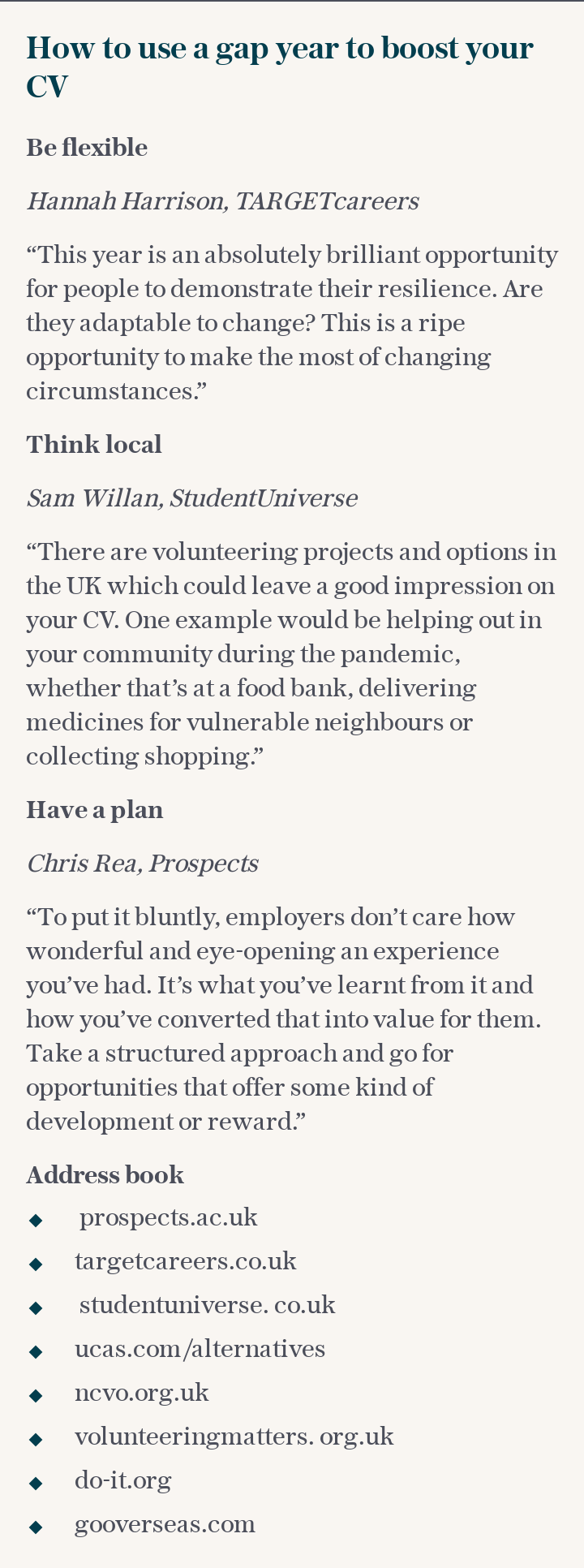Should I take a gap year during the coronavirus pandemic?

This year 18-year-olds across the UK have found their futures upturned. Despite initial reports suggesting that one in five students might postpone university for a year, mass deferrals haven’t yet materialised. In fact, the opposite appears true, with current data showing a 19pc increase in students “un-deferring” – putting gap year plans on hold to return to study.
With a recession on the horizon, students worry that a gap year is just delaying the inevitable graduation into a bleak-looking job market where you are a year behind your peers on the career ladder. Already the effects are to be felt on young people who graduated this year – a study by Prospects showed 28 per cent of final-year students have had job offers cancelled or deferred since the crisis. There is also concern that there will be nothing worthwhile to do in the new normal – part- time work in hospitality has been hit hard and foreign travel runs the risk of being stranded abroad.
Despite all this, gap years are still on the table for many who are worried about the social side of university, disappointed that freshers’ week might be a pale Zoom-enabled imitation of those that went before, and wondering if it might be better to wait until things get back to normality.
Read more: Where to travel on your gap year during coronavirus
Jude Tyrrell, 18, from Saltdean, is one of them. He would defer the year but Cambridge, where he has a place to study computer science, cannot guarantee offers for 2021. Although he has a conditional offer, he’s not sure he’ll take it up if he does meet the A*A*A offer that Cambridge demands. “It just feels like my experience is going to be vastly different to everyone else I know,” he says. However, he wouldn’t want an unplanned gap year to result in “just sitting around”.
Holly Hembury, 18, from Chigwell, also considered deferring her paramedic science place at the University of East Anglia. Although the university has yet to announce specific measures, she is worried about reports of students being limited to small social bubbles, housed with people from their course to limit the numbers of people mixing. “If you’re in a flat and they’re the only people you can socialise with and you don’t get on well, then it’s going to be quite lonely,” she says.
With so much uncertainty what next year will bring, it makes sense that students are reconsidering their options, but Hannah Harrison, of TARGETcareers, reminds young people to consider the long term. “None of us know what the next 12 months have in store; it could be that you can go travelling further down the line,” she says.
Sam Willan, of travel company StudentUniverse, also points out: “One advantage of taking a gap year in 2020 is the cost. There are some great prices for the end of the year and early 2021.” This is particularly true for short-haul trips – an excellent opportunity to practise foreign language skills – with return flights to Paris in November from £81.
If you are wavering over your options, Chris Rea, of student advice service Prospects, advises reframing things. “Gap year is not necessarily the right term, because that implies a break from reality,” he says. “You can have just as profound an experience half a mile down the road as you would travelling around the world.” In fact there are now some great “virtual” gap year opportunities you can do from home that offer an international experience.
Read more: A-level results day 2020 advice
Enrol yourself on an online Teaching English as a Foreign Language course at Go Overseas and work in online language schools. They also have a wide range of virtual internships, studying or volunteering abroad, options which Harrison says could be hugely beneficial to students who don’t want to travel. “By going into a more digital space, we open doors for people who might not have been able to access those opportunities before,” she says.
Rea predicts a post-lockdown surge in UK-based volunteering opportunities that students could take advantage of “enthused and infused with the spirit of co-operation, selflessness and collectivism”. Resources like the National Council for Voluntary Organisations, Volunteering Matters and Do IT list hundreds of roles, from delivering food parcels to working on allotments.

All this may not sound as grand as building a school in Nepal but volunteering is a chance to make a difference and flesh out a CV before going back into education. “Anything a young person can do to gain employability skills, the better,” says Harrison. A break from studying is also a chance to consider what you really want to do. As Harrison says: “Often we get on to this treadmill of school, exams, university, exams and you don’t actually take a moment to step back and ask, what is it that I enjoy?”
It might also look appealing to students eyeing up £9,250 a year tuition fees for a degree that could end up being mostly online (students are still expected to pay the full tuition price). Annice Headman, 18, from Croydon, is heading to York to study computer science but with most universities planning blended schedules of online classes and small seminar groups, she is sceptical about what kind of university experience she is facing, and if it will be of the same quality as degree courses pre-lockdown.
“I don’t see the point in staying in my halls all day and not even getting to learn face to face. They say they plan to start as normal... I just don’t know how it will work and I don’t like not knowing. I am concerned it will be a lot harder,” she says.
Value for money was also on the mind of Georgia Pitts, 18, from Caterham, who decided on the University of Law, Guildford for this reason: “They already ran online classes and it’s a small university so they were sure we could start in September... I felt like I knew where my money would go.”
For some students, taking a gap year in 2020 may not be feasible, even if they wanted to. Catherine Anderson, 18, from Sheffield, considered deferring her place to study English and theatre at the University of Lincoln but reasoned: “I wanted to do something really beneficial but with theatre and entertainment... I just thought there wouldn’t be many job opportunities for people already in it, never mind people just wanting experience. So I decided to go [to university] this year and then I’m not wondering what to do with myself.”

Rea emphasises that students should think back to the initial reasons for making their 2020 plans. “These are questions that students always have to address... It still should be, is this the right thing for me to do at this time when presented with all these different options?” he points out.
Crucially, Rea underlines that taking a year out should not be a knee-jerk reaction to the pandemic. “Do it because it’s the right thing to do and it’s a constructive thing to do and not because it’s a whim. There have got to be strong drivers for it,” he says.
Read more: Best gap year ideas for 2020

 Yahoo News
Yahoo News 